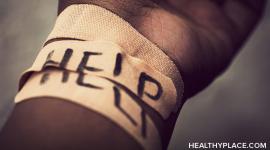My Child Self-Injures, Self-Harms

10 important things for parents of children who self-injure to keep in mind.
10 Thoughts For Parents to Consider
1. Don't panic. If medical attention is needed for your child's cutting, then get that medical attention immediately. A cut is a cut regardless of how it got there. This should be your first concern. You must do whatever you need to do to ensure their safety.
2. Don't neglect the obvious or be afraid to talk about cutting, burning or other self-injury behaviors if you think your child is doing so. Keep asking, in hopes of finding an "open door" for discussion. If that door is closed, it is imperative that you try some new techniques to get the door open or immediately find someone for your son/daughter to talk to. And if your child is not willing, you should seek counsel from your family doctor or a therapist to determine ways to encourage your child to respond to the situation.
3. Seek counsel. Every child is different, and so is every situation. Unless one has been around cutting and had experience dealing with self-harm issues, or has done so themselves and have worked through their issues, I wouldn't put too much hope in that person being able to "connect" with your child. Finding the right counselor is key, and driving a couple of hundred miles to meet with them is not asking too much in dealing with a behavior and mindset that is going to require wisdom, tenacity, and gentle but firm intervention.
4. In some cases, apply consequences for self-mutilation when determined to be effective. Not all self-injurers need to be given "discipline" for harming themselves. Determine that need based upon the counsel, wisdom, and direction from those who have been involved with self-injurers and know the steps to resolve the behaviors.
5. Connect with the person in other ways that aren't surrounded by self-harm issues. A well-rounded relationship is important. Most kids want to know that they'll continue to be loved even when they mess up. It's easy to love someone when they're doing well....it's harder when they're not doing so well. They want to know the latter.
6. Don't be afraid of having your child on medication. If it is going to help them think better, pull out of their depression, or balance their emotions, it's important to keep an open mind and consider all the treatment possibilities.
7. Develop a system of accountability around your child with family and friends. Most people wait to show the desire to develop relationships with their child after the problems arise. Have the relationship intact before the difficult years arrive. And if you think that you're child is immune from having issues, or that they aren't capable of struggle through their teen years, that couldn't be further from the truth.
8. Get to the root of the issue. Remember, it's not the behavior that is the issue. Just getting your child to stop cutting, burning, scratching or injuring themselves in some other way will not solve the problems. Ignore the deeper issues and you'll find that they'll pop up disguised as other behaviors.
9. Don't minimize the problem or think that this really isn't as big as everyone thinks it is. Self-injury is not an attempt at suicide. But, there are those that have committed suicide who have been self-injurers. Moms and Dads, this is serious stuff and it's going to demand serious (and immediate) help. Ignoring the obvious could prove catastrophic.
10. Do whatever you have to do to ensure your child's safety. This may mean that they are supervised 24-7. It may mean that they need to be hospitalized.
Source:
- Mark Gregston, Founder of Heartlight Ministries, a program for struggling and troubled teens in family crisis.
APA Reference
Staff, H.
(2008, November 2). My Child Self-Injures, Self-Harms, HealthyPlace. Retrieved
on 2026, March 3 from https://www.healthyplace.com/parenting/self-injury/my-child-self-injures-self-harms



